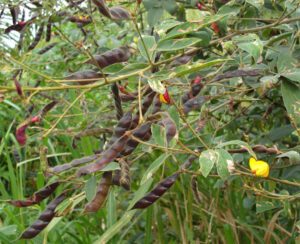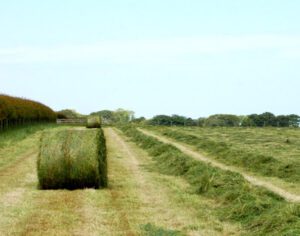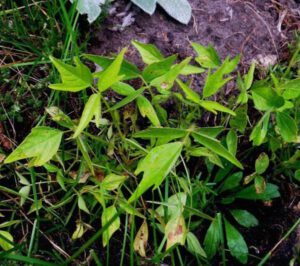Cashew farming is a very old and traditional business in many countries around the world. Both price and demand of cashew (cashew nut) are much higher in the market, so it is a highly profitable business. The cashew tree is actually a tropical evergreen type tree that produces the cashew seed and the cashew apple accessory fruit. And like the tree, the nut is often simply called cashew
The cashew trees are much larger and can grow as high as 46 feet. The largest cashew tree in the world covers an area of 81,000 square feet and is located in Natal, Brazil. But the dwarf cultivars grow around 20 feet and they are more productive, with earlier maturity and greater yields.
The fruits of the cashew tree is a kidney or boxing-glove-shaped drupe that grows at the end of the cashew apple. The drupe develops first on the tree and then the pedicel expands to become the cashew apple. The cashew apple is a light reddish to yellow fruit, whose pulp and juice can be processed into a sweet, astringent fruit drink or fermented and distilled into liquor.
Along with the popularity of cashew nuts and fruits, the plant has several other uses. The shell of the cashew seed yields derivatives that can be used in many applications including lubricants, waterproofing, paints etc.
4 million tonnes of cashew nuts were produced globally in the year of 2019, with Ivory Coast and India as the leading producers. Burundi, Vietnam, and the Philippines also had significant production. However, commercial cashew farming is a very old and popular business. You can make good profits from this business if you can do everything perfectly.
Cashew Nutrition
Cashews are highly nutritious and beneficial for human health. But some people are allergic to cashews (although, they are a less frequent allergen than tree nuts or peanuts). Raw cashews are 44% fat, 30% carbohydrates, 18% protein and 5% water. And a 100 grams reference amount, raw cashews provide 553 Calories, 67% of the Daily Value (DV) in total fats, 36% DV of protein, 13% DV of dietary fiber and 11% DV of carbohydrates.[1] Cashews are also a great source of dietary minerals (including particularly copper, manganese, magnesium and phosphorus. They are also a good source of thiamin, vitamin B6 and vitamin K. Potassium, zinc, iron and selenium are also present in significant amount.

Top Health Benefits of Cashew
Cashews are highly nutritious and very good for human health. Like many other nuts, cashews many also help to improve your overall health. Cashews are beneficial in weight loss, improved blood sugar control and healthier heart. Here we are trying to describe the top health benefits of consuming cashews.
- Cashews are low in sugar but rich in fiber and heart-healthy fats and also plant protein. They are also a very good source of some important minerals such as copper, magnesium and manganese and all these nutrients are essential for energy production, brain health, immunity and bone health.
- Cashew are rich in carotenoids and polyphenols. These are two categories of antioxidants that may help to reduce inflammation and offer potection from many diseases.
- Cashews are less in calories, so they can be helpful for loosing weight. They are rich in fiber and protein content can help to reduce hunger and increase feeling full.
- Diet which is rich in nuts are shown to be beneficial to heart health. And cashews appear to offer some benefits to lower blood pressure, triglycerides and also cholesterol.
- Cashews are rich in fiber but low in sugar. And when these 2 factors combined, may help to reduce blood sugar levels and protect against the development of type 2 diabetes.
- Cashews are rich in zinc and vitamins that keep you healthy. Zinc is an immune boosting compound that is vital for basic cell processes.
- Regular consumption of cashew can help to boost brain functions. Brain is the most active organ of our body that requires a steady supply of fatty acids through diet for staying active. And cashew contain brain booster nutrients that may help to boost brain functions and keep your memory sharp.
- Cashews contain zeaxanthin and lutein which are antioxidants that protect from UV rays. The antioxidant pigments naturally occur in the eyes and are an essential defense against damaging light and may reduce the risks of developing age-related macular degeneration (AMD) and cataracts.
- Copper present in cashew helps to produce hair pigment-melanin that enhances hair color. The essential fatty acids in cashews also help to keep your hair shiny and healthy.
- Cashew nuts are rich in zinc that is essential to improve sperm count in males and fertility chances. Also, regular intake of cashew may help control weight and diabetes that increases male fertility drastically.
- Copper deficiency in the body is the main source of iron deficiency which then leads to anaemia. Consuming cashews regularly in moderation can effectively increase the level of copper in your body and fight free radicals as cashews nuts are enriched with copper.
- Cashew nuts contain a natural oil that is rich in selenium, zinc, iron, and antioxidants. It keeps your skin young and fresh. Copper improves the production of elastin and collagen. Collagen is an integral structural protein that is responsible for the elasticity of your skin.
Advantages of Cashew Farming Business
Like many other fruit or crop farming business, commercial cashew farming has also some advantages. Here we are trying to describe the top advantages of commercial cashew farming business.
- Starting commercial cashew farming business is very easy and simple, even the beginners can also start this business.
- Commercial production of cashew is very profitable and it’s a great way for making high profits.
- Large scale production of cashew is already an established business and many people are already doing this business for making profits.
- Cashew plants are generally very strong and hardy and they generally require less care and other management.
- Both demand and value of cashew are much higher in the market, and both are increasing gradually.
- Marketing cashew is very easy and simple. Because cashew has very good demand in the market.
- As commercial production of cashew is highly profitable, so it can be a great employment source for the people (especially for the educated but unemployed people).
- Production costs in commercial cashew farming business is comparatively less as compared to many other business.
- Cashew plants fruit continuously for many years once established.
- Cashews are highly nutritious and very good for human health. You can enjoy fresh cashews if you start your own production.
How to Start Cashew Farming?
Starting commercial cashew farming is just like starting other fruit farming business. It’s very easy and simple, even the beginners can also start this business easily. We recommend having practical knowledge before starting this business. Here we are trying to describe more information about starting and operating a successful cashew farming business from planting, caring to harvesting and marketing.
Site Selection
Cashew plants ca be grown in a variety of soil types, but the production will be much better on good/fertile soils. Deep and well-drained sandy loam soils without a hardpan are considered best for cashew farming. These plants can also thrives on sandy soils, but mineral deficiencies in the plants are more likely to occur. Water stagnation and flooding are not congenial for cashew. Heavy clay soils with poor drainage and soils with pH more than 8 are not suitable for cashew farming. Excessive saline and alkaline soils are also not good for these plants. Red sandy loam, lateritic soils and coastal sands with slightly acidic pH are best for cashew farming.
Prepare the Soil
Plough the land thoroughly and level it. Total costs of land preparation will vary depending upon the type and method of soil working. Land preparation should be completed during May to June.
Climate Requirement For Cashew Farming
The cashew tree is cultivated in the tropics between 25°N and 25°S, and is well-adapted to hot lowland areas with a pronounced dry season, where the mango and tamarind trees also thrive. Temperature range between 20°C and 30°C is considered best suited for cashew farming. Cashew needs a climate with a well-defined dry season of at least 4 months to produce the best yields.
Choose a Variety
Many different cashew varieties available to choose from. You can choose the dwarf variety as it is highly productive and start fruiting faster.
Cashew Propagation
Cashew can be propagated by seeds and also vegetatively propagated by grafting. One year old shoots as well as current season shoots (3-5 months old) are used for grafting.
Purchase Plants
If you want to avoid the hassle of propagation, then you can purchase ready-plants from the nurseries. Today, there are many nurseries available for ready cashew plants.
Planting
Planting cashew plants is very easy. But you have to be conscious about the planting space. Generally planting space of 8 meter x 5 meter is recommended. The trees grow vigorously in the first 3 years and as soon as the crowns touch each other alternate trees should be removed until the permanent planting distance of 10-12 meter is reached.
Caring
The cashew plants are very strong and hardy and they generally require less caring and other management. Although, taking additional care will help the plants to grow well and produce more.
Fertilizing: Application of 10-15 kg of farmyard manure per plant is recommended to ensure adequate organic matter in the soil. And chemical fertilizers recommended for a mature cashew tree are 1.1 kg urea, 750 grams single super phosphate and 200 grams muriate of potash.
Watering: Watering or irrigation is a very important factor in cashew production, especially during the establishment of young trees. Because, providing adequate irrigation doubles the growth tempo of young trees in a dry season. Although, the trees can survive several months without irrigation, mainly due to the deep root system. The mature cashew trees should receive 1800 liters of water per tree every 2 weeks.
Mulching: Mulching helps to retain moisture into the soil, and at the same time it helps to control weeds. You can use organic materials for using as a mulch.
Controlling Weeds: In commercial cashew farming, weeding with a light digging should preferably be done before the end of rainy season. Hoeing, cutting the weeds off the underground is more effective than slashing.
Pruning: Branches hanging on the ground should be removed because they interfere with harvesting.
Inter-cropping: Tall growing inter-crops like certain varieties of sorghum and millet should not be encouraged between young cashew plants (because they will provide too much shade). Leguminous crops such as groundnut and beans are very suitable for intercropping. Cultivation of horse gram, cowpea, groundnut etc. are also recommended as inter-crops in cashew farming.
Pests & Diseases
Like many other commercial crops, the cashew plants are also susceptible to many pests and diseases. There are about 30 species of insects infesting in cashew farming. Out of these tea mosquito, flower thrips, stem and root borer and fruit and nut borer are the major pests which are reported to cause around 30% loss in yield of cashew nut.
The cashew crop basically doesn’t have any serious disease problem expect the powdery mildew caused by a fungus (which affects the young twigs and inflorescence and makes it wither). This disease generally appears when the weather becomes cloudy. You can easily control this disease by dusting with 2% sulfur W.P.
Harvesting
Cashew plants start bearing after 3 years of planting, and they reach full bearing during the 10th year and counting giving remunerative yields for another 20 years. The cashew nuts are generally harvested during February to May. Harvesting generally consists of picking of nuts that have dropped to the ground after maturing. However, if the apples are also used for making jam, juice, syrup etc. then the fruits have to be harvested before it falls naturally. Post harvesting tasks or processing of cashew involves these steps:
- Preliminary cleaning
- Roasting
- Shelling
- Separation
- Drying
- Peeling
- Grading and
- Packaging
Yield
It’s actually very tough to tell the exact amount. And total yield also depends on numerous factors.
Marketing
Marketing raw cashew is very easy and simple. You will probably be able to sell your products easily in the market. Although, you should set your marketing strategies before starting this business.
These are the common steps and ways for starting and operating a successful cashew farming business. Hope this guide has helped you. Good luck and may God bless you!







Is this farming possible in India?
Yes, cashew farming is possible in India, and India is one of the major cashew-producing countries in the world. Cashew trees thrive in tropical climates with well-drained soil, and several states in India provide suitable conditions for cashew cultivation. Some of the prominent cashew-producing states in India are Kerala, Goa, Maharashtra, Andhra Pradesh, Tamil Nadu and Karnataka. Good luck!